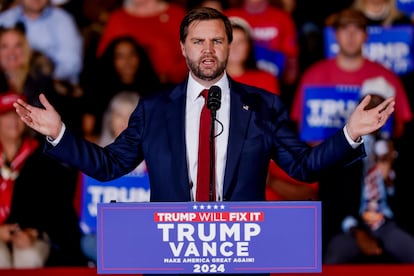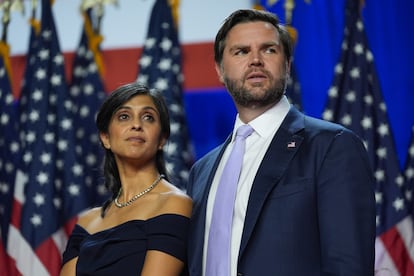J. D. Vance, Trump’s bet to secure the future of the MAGA movement
Despite a difficult childhood in a broken Appalachian family, the next vice president studied at Yale. His friendship with one of the magnate’s sons facilitated his selection as number two


Someone capable of saying that teenagers choose to transition to circumvent the DEI (diversity, equity and inclusion) quotas of Ivy League universities will be the next vice president of the United States. J. D. Vance, 40, has also stated that many women who have abortions celebrate with parties and even cakes, and that Donald Trump and he would have the support at the polls of all “normal gay guys.” Of course, he also said — before being chosen as the Republican heir apparent — that Trump was “America’s Hitler.” But that, he said, despite the insistence of the newspaper archives and the good memory of the social networks, did not pose any obstacle for him to be anointed as number two and, who knows, perhaps successor if the number one, president-elect Trump, does not last the entire term given his age.
Vance, brought up without a father and in the long shadow of a mother consumed by drugs, whom he publicly rehabilitated, once clean, was raised by “Mamaw,” his grandmother, a woman of action — when she died, an arsenal was discovered in her house. He does not deny his origins, he never has, but he will never cease to be an upscale outcast. From the Appalachians of his childhood to studying law at Yale (one of those universities that he now supposes is full of trans students), serving in the Marines, or being a venture capitalist in Silicon Valley, there is a sidereal distance that not even a successful person like Vance can metabolize without being assaulted by ghosts of the past.
Add to that vital blur the fact that a self-confessed racist — he has repeatedly given fuel to the unhinged story that Haitian refugees ate dogs and cats in Springfield (Ohio) — is married to Usha, of Indian descent, and the pieces of the identity puzzle are even more difficult to fit together. On how to fit in with the family of his wife, an exponent of the increasingly thriving Indo-American community, he often pulls out the everyday anecdotes he is so fond of at his rallies, recounting how he tried, unsuccessfully, to learn to cook the strictly vegetarian dishes of their diet. It is another identity paradox, if not a blatant contradiction: that both Vance and Trump, no strangers to xenophobic outbursts, are married to women of foreign origin, in the case of the president-elect twice, which says more about the collective memory loss of their voters than their personal inclusivity.

Regarding the Springfield Haitian hoax, one of the two moderators of the televised debate that pitted Vance against his Democratic rival Tim Walz had to remind him on air that they had the legal status of refugees, not subhumans, as he and his boss depicted them, but to little effect: as if guided by autopilot, he continued to propagate, without blushing, his face unmoving, all the lies that Trump has spread, including that the 2020 election was stolen from him. But the kindness, even cordiality, with which he whitewashed MAGA denialism in that debate should not make us lose sight of the fact that, ideologically, for many, he is more frightening than Trump himself because, unlike Vance, the president-elect’s strength is in his rhetoric. In fact, his selection as number two, thanks to his friendship with one of Trump’s sons, was seen as an ideological buttress to Trump’s volte-face.
Someone capable of saying that Kamala Harris was not qualified for the U.S. presidency because she has not given birth — a comment he originally made in 2021, claiming that childless women remedied their loneliness with cats, and which the always voracious algorithms caused to resurface during the campaign — demonstrates Vance’s disdain for those who are different, and that includes women, the LGBTQI community, and immigrants. Vance is now projecting onto the U.S. the future of the most extreme right; the alt-right that succeeded the Tea Party and that metastasized in the old and honorable GOP.
Vance rose to fame in 2020, when he was elected senator for his native Ohio thanks to the success of his memoirs, Hillbilly Elegy, a story of personal improvement and the American dream that would seem like a perfect work of fiction if it were not about his own life story: the poor boy from Appalachia, who could have fallen into the web of fentanyl — his obsession with the addiction crisis sweeping the U.S. is a constant in his speeches — who managed, through tenacity and effort, to climb to the highest peaks of society. And eventually to politics and power, with a capital P: as the new vice president of the United States.
“I am not a senator, a governor, or a former cabinet secretary. I haven’t started a billion-dollar company or a world-changing nonprofit. I have a nice job, a happy marriage, a comfortable home, and two lively dogs,” Vance writes at the beginning of the book, published in the U.S. in 2016, the same year that Trump arrived in the White House. A nod to the personal confluence of two strange partners in crime: the parvenu, the white-collar careerist, and the person he described, in private, as “America’s Hitler” and in public as “cultural heroin” (a distant Marxist echo, that of the opium of the masses, of which he may not even be aware). A comment just as derogatory as the one about Harris’s lack of children but to top it all off — from someone like Vance, who instead of a social elevator has had a rocket — classist.
Sign up for our weekly newsletter to get more English-language news coverage from EL PAÍS USA Edition
Tu suscripción se está usando en otro dispositivo
¿Quieres añadir otro usuario a tu suscripción?
Si continúas leyendo en este dispositivo, no se podrá leer en el otro.
FlechaTu suscripción se está usando en otro dispositivo y solo puedes acceder a EL PAÍS desde un dispositivo a la vez.
Si quieres compartir tu cuenta, cambia tu suscripción a la modalidad Premium, así podrás añadir otro usuario. Cada uno accederá con su propia cuenta de email, lo que os permitirá personalizar vuestra experiencia en EL PAÍS.
¿Tienes una suscripción de empresa? Accede aquí para contratar más cuentas.
En el caso de no saber quién está usando tu cuenta, te recomendamos cambiar tu contraseña aquí.
Si decides continuar compartiendo tu cuenta, este mensaje se mostrará en tu dispositivo y en el de la otra persona que está usando tu cuenta de forma indefinida, afectando a tu experiencia de lectura. Puedes consultar aquí los términos y condiciones de la suscripción digital.








































